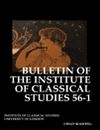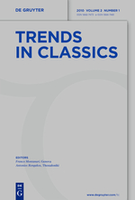
GYMNASIUM
metrics 2024
Exploring the Nexus of Classics and Education
Introduction
GYMNASIUM, published by Universitätsverlag C Winter Heidelberg GmbH, is an academic journal dedicated to the fields of Classics and Education. Since its inception in 1970, the journal has served as a platform for scholarly discourse, focusing on the intersection of classical studies and educational methodologies. Despite its discontinuation from Scopus coverage post-2021, GYMNASIUM remains an important resource for researchers, professionals, and students, fostering a deeper understanding of ancient texts and their relevance in contemporary educational frameworks. Current rankings place the journal in the Q4 quartile in both Classics and Education categories, reflecting its niche yet significant contribution to these fields. Researchers can access the journal's past issues through various academic libraries in Germany, enhancing interdisciplinary study and promoting scholarship across broader educational horizons.
Metrics 2024
 0.10
0.10 0.20
0.20 0.20
0.20 5
5Metrics History
Rank 2024
Scopus
JCI (Web Of Science)
Quartile History
Similar Journals

Antichthon
Unveiling Insights from the Ancient WorldAntichthon, published by Cambridge University Press, stands as a vital platform within the field of Classics. Established in 1986, the journal has evolved to encompass scholarly contributions that explore various dimensions of classical studies, including literature, history, and cultural studies. With its rich publication history extending from 2011 to 2023, Antichthon boasts a commendable Q2 ranking in the latest 2023 Category Quartiles for Classics, reflecting its significant impact in the academic community. Although the journal does not offer an Open Access option, it continues to engage researchers and academics with its curated selection of articles, reviews, and critical insights. Located at the Edinburgh Building, Shaftesbury Rd, Cambridge, England, this journal remains an essential resource for both established scholars and students aiming to deepen their understanding of classical antiquity and its enduring relevance.

QUADERNI URBINATI DI CULTURA CLASSICA
Exploring the Rich Tapestry of Classics and LinguisticsQUADERNI URBINATI DI CULTURA CLASSICA is a distinguished academic journal dedicated to the interdisciplinary exploration of Classics, Linguistics, and Literary Theory. Published by ACCADEMIA EDITORIALE PISA-ROMA, this journal serves as a vital scholarly platform for researchers and professionals alike, facilitating in-depth discussions and analyses that contribute to these evolving fields. With an ISSN of 0033-4987 and an E-ISSN of 1724-1901, it boasts a robust Scopus ranking, placing it within the second quartile in Classics and the third quartile in related disciplines as of 2023. Although it is not an open-access journal, QUADERNI URBINATI DI CULTURA CLASSICA remains essential for those engaged in the study of language, literature, and classical cultures, encouraging scholarly exchange and innovation from its base in Rome, Italy. Researchers and students will find valuable insights and methodologies within its pages, making it a key resource for fostering academic growth and understanding.

Rivista di Filologia e di Istruzione Classica
Unveiling the Rich Tapestry of Classical TextsRivista di Filologia e di Istruzione Classica is a distinguished academic journal published by LOESCHER EDITORE, dedicated to advancing the fields of Classics and Linguistics. Based in Italy, this journal serves as a vital platform for original research, critical analysis, and scholarly discussions that enrich our understanding of classical texts and educational methodologies in the humanities. With its unique focus on the intricate relationship between classical literature and language, the journal aims to facilitate discourse among researchers, educators, and students alike. Although categorized in the fourth quartile in both Classics and Linguistics, it provides an essential venue for scholars seeking to disseminate their findings and engage with contemporary academic debates. The journal is indexed in various databases, though recent coverage in Scopus has been discontinued. Researchers interested in exploring the complex layers of classical philology and instructional practices are encouraged to contribute to and engage with the innovative scholarship presented in this journal.

AMERICAN JOURNAL OF PHILOLOGY
Exploring the Depths of Classics and CultureThe American Journal of Philology is a premier scholarly publication dedicated to the field of classics, literature, cultural studies, and linguistics. Published by Johns Hopkins University Press, this esteemed journal boasts an impressive reputation, reflected in its high impact factor and robust rankings—achieving a prestigious Q1 classification in Classics and Literary Theory, while securing a Q2 in Cultural Studies and Linguistics for 2023. The journal provides a rigorous platform for original research, critical essays, and innovative inquiries, contributing significantly to contemporary discourse in the humanities. Its comprehensive scope encompasses interdisciplinary studies, making it a vital resource for researchers, professionals, and students alike. Although it does not operate under an open-access model, the journal ensures that its content remains accessible to a wide audience through institutional subscriptions. With a publication history dating from 1972 to the present, the American Journal of Philology continues to be pivotal in fostering academic excellence and enriching the understanding of philological studies.

RAMUS-CRITICAL STUDIES IN GREEK AND ROMAN LITERATURE
Exploring the Echoes of AntiquityRAMUS: Critical Studies in Greek and Roman Literature, published by Cambridge University Press, stands as a premier journal dedicated to the exploration and analysis of classical literary texts. Established in 2002, this journal has garnered recognition in its field, achieving a Q1 category ranking in both Classics and Literature and Literary Theory for 2023, which reflects its commitment to scholarly excellence. With an impressive Scopus ranking, where it places in the 76th percentile for Literature and Literary Theory and the 70th percentile for Classics, RAMUS is a critical resource for researchers, professionals, and students engaged in the study of ancient texts and their lasting impact on contemporary literature. Although currently not an open-access journal, it offers a wealth of peer-reviewed articles, reviews, and critical essays that enrich understanding and foster discussions in the realms of Greek and Roman literary traditions. This journal not only serves as an academic platform but also contributes to the ongoing dialogue on the relevance of classical literature in today's cultural and literary discourse.

Cuadernos de Filologia Clasica-Estudios Griegos e Indoeuropeos
Illuminating the Foundations of Greek and Indo-European StudiesCuadernos de Filologia Clasica-Estudios Griegos e Indoeuropeos, published by Universidad Complutense de Madrid, serves as a vital platform in the fields of Classics and Linguistics. With an ISSN of 1131-9070 and an E-ISSN of 1988-2637, this journal showcases rigorous academic research that spans both Greek studies and Indo-European linguistics. Recognized within the Q1 quartile in Classics and the Q2 quartile in Linguistics and Language, it highlights its standing among peers in these disciplines, particularly reflecting its commitment to advancing scholarly conversation. Though currently lacking in Open Access options, its emphasis on quality content ensures it maintains an intellectual influence, as evidenced by its ranking of #112 in Classics and efforts to engage researchers and students alike. The journal's coverage from 2011 to 2024 positions it as a rich historical resource, while its address in Madrid places it at the heart of European classical studies. By offering insights into the fundamental aspects of language, literature, and ancient cultures, Cuadernos de Filologia Clasica remains a critical resource for those seeking to deepen their understanding of the classical world and its enduring linguistic legacies.

Auster
Unlocking knowledge for a transformative educational future.Auster is a prominent open-access journal dedicated to advancing interdisciplinary research within the fields of Humanities and Educational Sciences. Published by the esteemed Universidad Nacional de La Plata, specifically by the Faculty of Humanities and Educational Sciences, this journal has been a cornerstone for scholarly discourse since its establishment in 1996. With an ISSN of 1514-0121 and an E-ISSN of 2346-8890, Auster ensures wide accessibility to innovative research and critical analyses. Its commitment to open access fosters an inclusive academic environment, allowing researchers, students, and professionals in Argentina and beyond to engage with high-quality content that stimulates new ideas and interdisciplinary collaboration. The journal strives to publish timely, relevant articles that explore contemporary challenges in humanities and education, thereby positioning itself as an essential resource for anyone invested in these dynamic fields.

BULLETIN OF THE INSTITUTE OF CLASSICAL STUDIES
Pioneering Research at the Intersection of Classics and ModernityBULLETIN OF THE INSTITUTE OF CLASSICAL STUDIES, published by Oxford University Press, serves as a vital platform for the dissemination of research in the fields of Classics, Archaeology, History, and Linguistics. Established in 1954 and continuing to present day, this journal emphasizes scholarly contributions that delve into the nuances of ancient civilizations while fostering interdisciplinary dialogue. With an impact factor reflective of its performance in the Q4 quartiles across various fields, it provides a unique fusion of traditional and contemporary inquiries that challenge existing paradigms. This esteemed journal also stands out for its comprehensive coverage, appealing to a diverse audience comprising researchers, professionals, and students aiming to enrich their understanding of classical studies. Although it currently does not offer open-access options, the BULLETIN remains committed to advancing knowledge and scholarship in an increasingly complex academic landscape, prioritizing the dissemination of rigorous research that contributes to the humanities.

Agora-Estudos Classicos em Debate
Pioneering Critical Conversations in the HumanitiesAgora-Estudos Classicos em Debate is a distinguished open-access journal published by UNIV AVEIRO, located in the heart of Portugal. Since its launch in 1999, the journal has committed to fostering scholarly dialogue within the fields of Classics and Literature and Literary Theory. As a testament to its academic rigor, it has achieved a Q3 ranking in both subject categories for 2023, placing it among relevant discourses in the humanities. The journal's Scopus ranks reveal its standing within the community, with a rank of #577 out of 1106 in Literature and Literary Theory and #101 out of 170 in Classics. By providing a platform for original research and critical discussions, Agora serves as a vital resource for researchers, professionals, and students eager to explore the nuanced intersections of classical studies and contemporary literary analysis. With the advantage of open access, the journal ensures that knowledge is disseminated widely, embodying its commitment to academic accessibility and excellence.

Trends in Classics
Illuminating the intersection of history, literature, and archaeology.Trends in Classics is a distinguished academic journal published by WALTER DE GRUYTER GMBH, dedicated to advancing the field of Classics through critical scholarship and innovative research. With an ISSN of 1866-7473 and an E-ISSN of 1866-7481, this journal offers a platform for scholars from around the globe to share insights on classical literature, history, and archaeology. Indexed in Scopus and awarded a respectable Q4 classification in Classics, it ranks 48th out of 170 in the Arts and Humanities category, placing it in the top 72nd percentile—an indicator of its growing influence and contribution to the field. Operating from Germany, specifically from Genthin Strasse 13, D-10785 Berlin, the journal spans converged years from 2009 to 2024, fostering ongoing dialogues and developments within classical studies. Although it does not currently offer open access, its commitment to scholarly excellence makes it a vital resource for researchers, professionals, and students alike, who seek to deepen their understanding of ancient cultures and their lasting impacts on contemporary society.